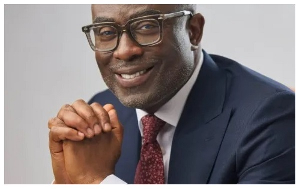Diasporia News of Sunday, 16 November 2003
Source: Plain Dealer
Reaching out to help and heal
Clevland, OH, USA -- Dr. Emmanuel Tuffuor has seen a lot of misery and suf fering over much of the last half-century - in the torrid hinterlands of southern Ghana and the impoverished streets of East Cleveland.
But it's in these areas Tuffuor prefers to practice medicine, even though he could earn more money and distinction working elsewhere.
Prestige means little to Tuffuor, a native of the dusty village of Kumasi, Ghana. He works long hours each day and crisscrosses the Atlantic Ocean several times a year to assure that people in poor neighborhoods, jail or on society's fringes get quality health care.
"I see health care as a universal right," said Tuffuor, who attributes his approach to life and career to his grandmother, Aninwah, who raised him and his seven sisters.
The late Aninwah was an untraditional African woman, a matriarch who defied the rigors of a male-dominated society. She started a business to raise money for the children's education.
She told Tuffuor he had to become the man of the family after his father died when he was a child. And she instilled in him and his sisters the importance of a strong work ethic and the notion of helping those less fortunate.
Those lessons remain with Tuffuor. His pace is relentless.
Tuffuor runs full-time private medical practices in East Cleveland and Warrensville Heights, teaches a six-week course in international health each year at Case Western Reserve University and provides medical service twice weekly to inmates at the Cuyahoga County Jail.
In addition, he travels to Emena, Ghana, a half-dozen times a year to help oversee the Aninwah Medical Center - named after his grandmother - which he founded 12 years ago.
A magazine
Here at home, another project is under way. This fall, he will publish the first edition of a free monthly health-care magazine aimed at educating the black community about health issues.
The magazine initially will be distributed in East Cleveland, Warrensville Heights and parts of Cleveland in places including senior centers, grocery and convenience stores, and beauty parlors and barber shops, Tuffuor said.
"It will help them . . . engage their physicians [in discussion] about their conditions," he said.
It will cost the doctor about $1,500 a month to publish the magazine, tentatively titled The Foundation Health News. The publication will be produced with help from volunteers at the Glenville Health Foundation, a nonprofit group Tuffuor founded two years ago to educate African-Americans on health care.
With assistance from volunteers, including a handful of doctors who have agreed to periodically write articles, Tuffuor's latest project is not expected to cut too deeply into the time he spends with his family.
Tuffuor, who is married with three children, has not taken a real vacation in three years. His golf clubs and racquetball equipment are collecting dust.
"Trying to improve someone's life is the recreational part of my life," said Tuffuor, who went into private practice 20 years ago in East Cleveland.
"It seems like when I'm giving to people, in some ways I'm helping myself, too, because it brings me a lot of inner peace and joy and happiness," he said. "And in some ways it allows me to function in other aspects of life because of what I do."
Tuffuor's wife, Tanya McKnight-Tuffuor, colleagues and friends have watched the doctor keep up an unenviable work pace for years, although they say he is never frazzled or short with people.
"He has a lot of energy and doesn't need a lot of sleep," said McKnight-Tuffuor, a community care coordinator for the Visiting Nurse Association.
When pressed, she admits she would enjoy seeing more of the man with whom she has spent the last 20 years. But she understands and supports what he does for his family and people in need.
Tuffuor, 52, rises around 5:45 a.m. weekdays and spends as much time as possible with his wife and their youngest son, 14-year-old Matthew, before heading off to work. His daughter, Alli, is away at college; his oldest son, Osei, works in radio in Washington, D.C.
By 8 a.m. he is making rounds, visiting patients at South Pointe Hospital, St. Vincent Charity Hospital, Huron Hospital and University Hospitals. Around 10:30 a.m., he heads to his Warrensville Heights office for a good portion of the day. He usually arrives at the East Cleveland clinic by 3 p.m., leaving for home around 7 p.m., except when he works at the county jail. On those days, Thursday and Friday, he doesn't get home until 11 p.m. or later.
On one particular afternoon in his East Cleveland office, Tuffuor is in constant motion. He rushes from the lobby to the receptionist's office, from the medical table to the waiting room. His demeanor is one of concern.
The majority of his clients are black. But Tuffuor, who specializes in internal medicine, has cared for a diverse group of patients.
His West African accent, which still filters through despite his 30 years in the United States, has been a curiosity to some. Others have been mildly intimidated by it.
Tuffuor came to Ohio from Ghana when he was 20 to attend Bowling Green State University. At first, his grandmother was paying the tuition.
But when Tuffuor saw fellow students from well-off American families toiling as dishwashers to help make ends meet, he knew the payment arrangement could not work.
"If I continued to let her do that, the gates of heaven would be permanently shut for me," he said.
So he worked odd jobs, got academic scholarships and paid his way. In 1974, he graduated with a bachelor's degree in biochemistry. And in 1976, he started medical school at Case.
Tuffuor met his wife in 1983 during his residency at the now-closed Mt. Sinai Medical Center. Tanya McKnight, a nurse, gave him a hand with a patient. They became friends, started dating and were married three years later.
They now live in Chagrin Falls, a community McKnight-Tuffuor has grown to fancy after living for years in Shaker Heights, which she loved. The lots are bigger out there, the houses farther apart.
It took a little longer to get to know people, but the Tuffuor family has settled in and made friends. One thing has remained the same - the doctor's unrelenting workdays.
Taking a break
He does "kick back" sometimes, she said, takes a snooze and manages to watch "60 Minutes" almost without fail each Sunday.
But his true relaxation comes when working on his projects in Ghana, she said.
"If he has a nickel and someone needs it," he will give it away, she said. "He had a grandmother and grandfather who worked very hard to bring him here, and he will do whatever it takes to make them proud."
McKnight-Tuffuor cherishes the health care field, too, but enjoys working part time to spend more time with her children and minding the demands of the house.
She is also Tuffuor's biggest supporter and biggest critic, cheering him on when he's right and putting him back on course when he veers.
"She helps me with balance, being a father and meeting the hard task of being a physician," Tuffuor said. "She is supportive and tolerant. Without her support, it would have been impossible for me to do what I have done for Ghana."
Ahmed Elghazawi, medical director for the Cuyahoga County Sheriff's Department, described Tuffuor as a superb physician. "He treats people with dignity and respect and provides the ultimate medical care."
David Miller, a former ambassador to Tanzania and Zimba- bwe, agrees. He and his wife, Patti, met Tuffuor many years ago and helped him raise money for the hospital in Ghana.
"When I think of the many people I have worked with over the years, he has to be one of the most caring," said Miller, who considers himself "half African" because of the years he served as ambassador.
In order to make hospital care affordable in Ghana, Tuffuor and the Millers set up a program in which natives of Ghana living abroad pay a small annual stipend for health-care insurance for their relatives back home.
The 75-bed hospital opened in spring 1991 and provides a wide range of medical services from general medicine to surgery.
It's situated about seven miles from Kumasi, which has a population of about 1,000. But residents of some 50 villages in the region use the hospital.
Residents of Tuffuor's village were offended that the doctor did not build the hospital in the village of his birth.
And some expected special treatment because they were from Kumasi.
Tuffuor was forced to travel back often to explain what he was doing and why.
Good health care must be spread to everyone, Tuffuor said, regardless of whether you are black or white, rich or poor
"It's a joy to get them feeling better," Tuffuor said. "Some doctors love and command prestige . . . That is the least of my concerns."
Miller has teamed up with Tuffuor to help provide a medical relief aircraft to make it easier to get to people in remote areas of Ghana.
"For a man under as much pressure as he is, I have never seen him upset, short or curt with anyone," Miller said. "I'm not quite sure where that comes from."
Whether in Ghana or in East Cleveland, Tuffuor leaves the office or hospital each day hoping he has eased the pain for his patients, solved some problem. And he feels at ease.
"Health care is a partnership and there has to be give-and-take," he said.
"I feel there is a need to give back, not only to the communities I serve here, but also in the country where I came from. To share with others is an innate sort of thing I was raised with."
Opinions









